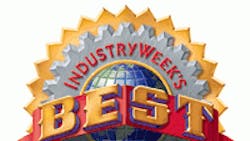National Gypsum Co. Apollo Beach Plant, Gibsonton, Fla.
Employees: 88, non-union
Total square footage: 400,000
Primary products: Gypsum wallboard. About 70% sold into residential construction market; remainder goes to commercial construction. The company supplies more than one-third of the Florida market, and board is shipped north into the southeast, including the Atlanta market.
Start-up: 2000
Achievements: No lost time injuries in 2004. Zero shipping errors for 35 consecutive months. 2004 marked the second consecutive year that the Apollo Beach facility earned National Gypsum Quality Plant of the Year Award (the competition is among the company's 20 wallboard plants).
"Our manufacturing achievements originate in one powerful management practice -- consistent production floor involvement," say Freeman Cohen Jr., lead operator on the production floor at National Gypsum Apollo Beach plant. Power plant waste is the raw material.
Cohen, who has worked at other drywall plants, says management's routine presence helps accelerate continuous improvement. He says the practice began at Apollo Beach with Terry Peterson, who was plant manager when the plant opened in 2000. (The first saleable wallboard came off the line on Jan. 24, 2001.)
McChesney's approach is influencing National Gypsum's 20 wallboard plants. For example, the company named Apollo Beach its Quality Plant of the Year for both 2003 and 2004. In addition, Apollo Beach serves as the role model for the company's next wallboard facility. That plant will be built near Charlotte, N.C., with production scheduled to begin in late 2007.
There's proof that the approach directly enhances the product. In just three years, quality at Apollo Beach has progressed from 0.125% defects (the NGC quality metric) to 0.0018% in 2003, says quality manager Patrick Macary. In 2004, the Apollo Beach plant improved that metric, reaching a remarkable 0.0009%, a 50% advance. That means 99.99% of the wallboard being shipped from Apollo Beach is perfect. First-pass yield is a notable 97.6%, adds Macary.
As the company moves toward higher and higher line speeds, the ADC system becomes more critical in terms of reaching and maintaining quality objectives. McChesney says Apollo Beach is the company' second plant to more than double the conventional line speed of 170 feet per minute. The experience gained by National Gypsum's first high-speed line (in Shippingport, Pa., near Pittsburgh) helped guide the implementation at Apollo Beach, including important refinements in the wet transfer process. In turn the experience gained at Apollo Beach will be applied to the new North Carolina plant.
McChesney's plant is currently producing 1/2 inch board at 470 feet per minute. At that rate, it can load more than five tractor-trailers each hour. (Maximum line speed is 500 feet per minute.)
McChesney rates customer service as one of National Gypsum's core competencies and describes it as one of five key operating strategies. He says Apollo Beach's shipping record underscores its contribution to customer service.
For example, from October 2001 through August 2004, the plant has experienced zero shipping errors for 35 consecutive months. That means for the past three years, Apollo Beach has shipped 67,396 truckloads, plus 2,243 rail cars of material with only one shipping error.
The plant is not immune to storms, however. During 2004 there were nine incidents of late deliveries, primarily due to the four hurricanes that ripped through Florida. The plant sustained minor damage during the storms, much less than employee homes, McChesney notes. "Even so, I could always count on employees braving the aftermath of flooding and debris to check on the plant."
From Waste To Wallboard
At Apollo Beach, conceptual excellence goes beyond achievements in process efficiency and embraces admirable thinking on leveraging -- while benefiting -- the environment. Central to the plant's strategy is fresh thinking that the environment can be an enabler and not an obstacle to industrial production and growth.
Siting of the Apollo Beach plant helps facilitate the green strategy. National Gypsum was fortunate enough to be able to locate the Apollo Beach plant on property contiguous with the location of Tampa Electric Co.'s coal-fired power plant. The result: Byproduct gypsum once destined for landfills now is trucked one mile to the Apollo Beach plant. McChesney says delivery via conveyor is being considered.
Thus the Apollo Beach plant qualifies as a solid waste disposal site under EPA. To assure raw material quality, Apollo Beach maintains constant communication with the power company, Macary says. By contract, the byproduct gypsum must have a purity rate of 94%. Typical purity rates for Tampa Electric's byproduct are 97%. McChesney says that although the plant was built with the intention of being single-sourced by Tampa Electric, heightened wallboard demand has made it necessary to source about 15% of its gypsum requirements from Nova Scotia.
| IndustryWeek is now accepting nominations for the 2006 IW Best Plants Program. |
"My ultimate goal," McChesney says, "is to enable the optimization of resources, whether equipment or people."
